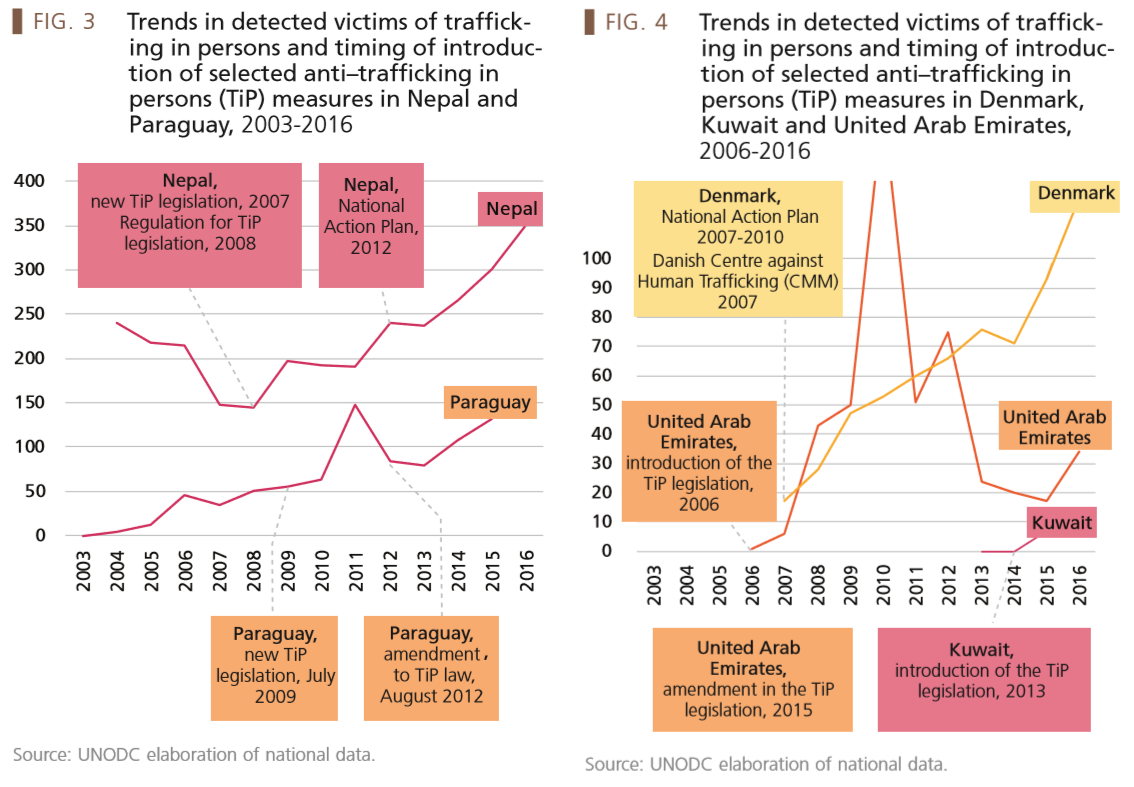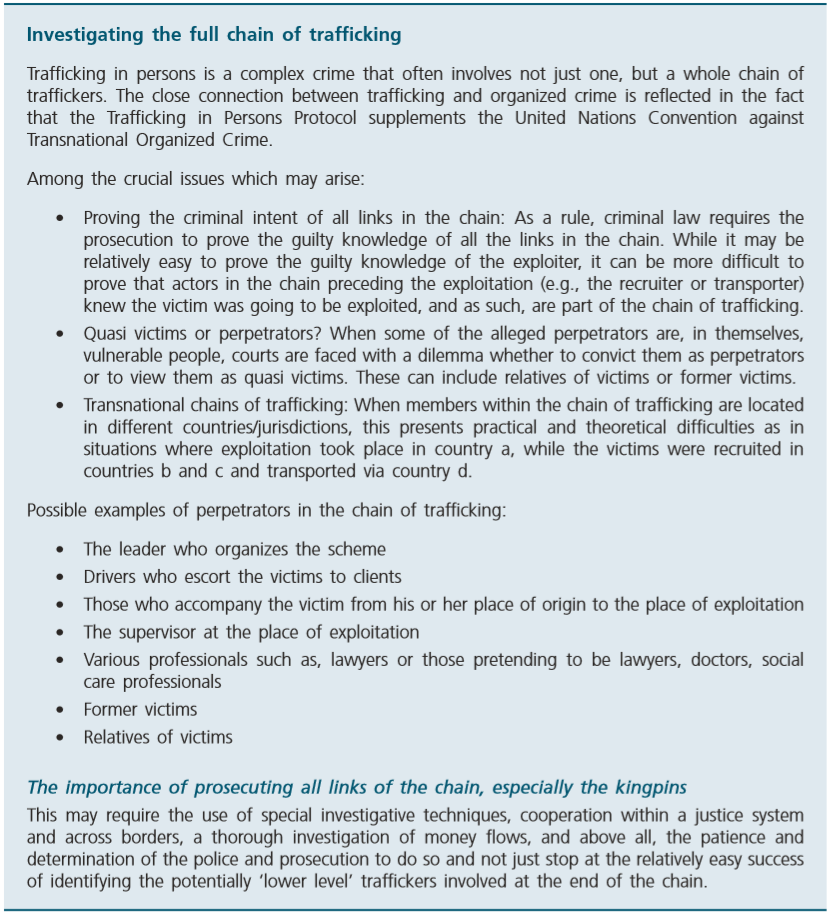Published in May 2019
This module is a resource for lecturers
Potential strategies to "turn the tide"
Considering the challenges associated with investigating and prosecuting traffickers, and cognisant of obligations to respect the rights of victims, there is an urgent need to develop and implement robust legal frameworks and criminal justice strategies, policies and practices, including the provision of necessary training and resources tailored to address such challenges. Such measures have shown to improve the identification of victims and the effectiveness of the criminal justice responses, as shown in the 2018 UNODC Global Report on Trafficking in Persons (p. 22) - see Figure 1:
Figure 1: The impact of anti-trafficking measures on victims' identification

Gallagher and Holmes (2008) identify eight essential aspects of an effective criminal justice response to trafficking, including:
- A comprehensive legal framework around trafficking, that accords with the Protocol against Trafficking in Persons.
- A specialist law enforcement agency to investigate cases of trafficking in persons.
- Related to this, a general law enforcement capacity to support specialists.
- Strong and well-informed prosecutorial and judicial support.
- Quick and accurate identification of victims, together with provision of protection and support.
- Special support to victims as witnesses.
- Systems and processes that enable effective international and judicial cooperation in trafficking cases.
- Effective coordination between actors supporting initiatives to combat trafficking.
Each of these elements is examined in detail in the above cited article. This section focuses on three strategies: effective investigation and prosecution initiatives, law reform, and cross-border collaboration between States.
Effective investigation and prosecution initiatives
If the global community is to turn the tide against traffickers, it must significantly scale up its efforts and examine the effectiveness of many existing anti-trafficking strategies. In particular, there is a need to establish sophisticated and well-resourced cross-border law enforcement responses to trafficking. This will take time and the cooperation of the global community. It will also take time to foster a better understanding among law enforcement actors and the judiciary of the complex circumstances and evidential challenges of many trafficking in persons cases. Concurrently, there is a need to increase the capacity of national criminal justice actors (including police, immigration, anti-money laundering agencies, prosecutors and judges) to investigate and prosecute traffickers and seize the proceeds of their crimes.
Law enforcement agencies and prosecutors should be offered skills-based training and provided with the funding, resources and equipment needed to effectively discharge their responsibilities. In line with the Compendium of UN Standards and Norms in Crime Prevention and Criminal Justice, this should include:
- Foundational trafficking in persons training covering the elements of trafficking and related crimes, including penalties and aggravating factors. Training regarding collation of evidence, the involvement of corruption and transnational trafficking patterns is also important.
- Investigative training, including surveillance, crime scene examination, victim-witness and offender interviewing, wiretapping and collection of data on computers and other electronic storage devices.
- Prosecution advocacy training, including cross-examination of offenders and their associates, calling and cross-examination of expert witnesses and the use of evidence in court.
- Protection, sensitive management of and assistance to victims by all criminal justice actors.
- Judicial training regarding elements of the crime, as well as appropriate responses to the trauma and vulnerability of victims, including directions and procedures for vulnerable witnesses.
David (2010) emphasizes the importance of properly funding and training law enforcement actors, arguing that, among other things, proper training requires "[r]aising the awareness of senior law enforcement about trafficking in persons both as an issue and as a crime type in the local community. For maximum impact, this training likely needs to include the presentation of real case studies, either from within the local area or from areas with similar characteristics to with the local area".
While the reported numbers of successful prosecutions are low, even these figures may exaggerate the achievements of the anti-trafficking sector. Available information suggests that the majority of cases involve the conviction of just one or two individuals, most of whom are low level actors within trafficking organizations who are readily replaced. Official figures may also underestimate successful prosecutions of traffickers. Where States do not have trafficking-specific legislation, it might be that traffickers are convicted and punished without the use of laws that accord with the Protocol against Trafficking in Persons. Of course, such laws may omit certain elements of the offence of trafficking under the Protocol, otherwise include elements not contemplated, or stipulate punishment insufficient to address the gravity of offending.
Ultimately, trafficking in persons is a business and, like all businesses, it operates based on profit and loss. A criminal justice response must take away these profits and increase the risk of apprehension. To achieve this, law enforcement agencies and prosecutors must endeavour to prosecute and punish "senior" offenders within transnational criminal syndicates. In addition, and in recognition that trafficking thrives in certain situations, crime prevention strategies must also focus on addressing structural conditions that increase risks of trafficking. These include, inter alia, improving socio-economic conditions in communities, protecting persons in conflict and post-conflict circumstances, and adopting child protection procedures to remove children at risk.
Figure 2: Potential offenders

Source: UNODC (2017), Evidential Issues in Trafficking in Persons Cases - Case Digest, p. 130
Approaches to investigation and prosecution should also consider the need for different strategies for different types of offenders. For example, gender aspects of offending should be incorporated and there should be greater focus on understanding pathways into criminal offending. As Broad (2015, p. 1073) argues, "[a] more responsive approach to trafficking would take seriously the pre-histories of offenders who commit these offenders, taking into account their migration journeys, the nature of their intimate relationships and their multiple experiences of exploitation".
Undertake priority law reform
The international community should continue to encourage countries to ratify/accede to the Protocol against Trafficking in Persons and enact domestic legislation criminalizing the offence. As of January 2019, 173 States are party to the Protocol. Additionally, each State should review, and as necessary, reform existing laws to empower law enforcement agencies, prosecutors and judges and remove obstacles to the timely and effective investigation and prosecution of suspected traffickers. In particular, this should:
- Enable law enforcement agencies and courts to collaborate with their cross-border counterparts and streamline the process for extraditing offenders and obtaining evidence from witnesses located in other jurisdictions.
- Enable law enforcement agencies to obtain judicial warrants to carry out audio, video and electronic surveillance on suspected traffickers.
- Enable prosecutors to offer low level offenders plea bargains or immunity from prosecution in return for giving evidence against senior offenders.
- Enable government agencies to trace and seize proceeds of crime and direct banks and financial institutions to refuse to provide banking facilities to traffickers and to freeze existing facilities.
- Establish specialist anti-trafficking law enforcement agencies and courts focused on expediting the investigation and prosecution of traffickers in countries where there are high levels of trafficking in persons.
- Allow prosecutors to apply for compensation awards against traffickers in favour of victims.
- Permit courts to give victims an opportunity to be heard through victim impact statements when sentencing offenders.
Establish functional cross-border collaboration and assistance between countries in which transnational trafficking occurs
The transnational nature of trafficking in persons creates challenges for crime detection, identifying members of criminal organizations, gathering and collecting evidence and arresting and extraditing offenders. These challenges, if not addressed, threaten to undermine the administration of justice and the rule of law in many countries. As noted above, international cooperation is critical for the success of investigations and prosecutions.
Article 18(3) of the United Nations Convention against Transnational Organized Crime provides that States parties shall afford one another the widest measure of mutual legal assistance in investigations, prosecutions and judicial proceedings in relation to the offences covered by the Convention (see also Module 11 "International Cooperation to Combat Transnational Organized Crime" of the University Module Series on Organized Crime). Mutual assistance may be requested for:
- Taking evidence or statements from witnesses.
- Effecting service of court documents.
- Executing searches and seizures and freezing assets.
- Examining objects and sites.
- Providing information, evidence and expert evaluations.
- Providing originals or certified copies of relevant documents and records, including government, bank, financial, corporate or business records.
- Identifying or tracing proceeds of crime, property or other things for evidentiary purposes and their seizure for the purpose of confiscation (see art. 13 of the Convention).
- Facilitating the voluntary appearance of persons in the court of the requesting State.
- Any other type of assistance that is not contrary to the domestic law of the requested State.
International cooperation requires commitment between States and their agencies, which may itself be challenging. Yet, as the examples that follow show, it can lead to promising outcomes.
Box 11
Terra Promessa - Promising practice 1
In 2006, Polish and Italian police dismantled a network trafficking men for the purpose of forced labour from Poland to Italy. Around 600 men are believed to have been recruited by means of newspaper and internet advertisements and forced into "debts" through transportation and accommodation costs. The men were kept in barracks and watched by armed guards, and forced to work up to 15 hours a day for approximately 1 euro per hour, despite having been offered between 5 and 6 euros per hour. A parallel investigation was conducted by the Italian and the Polish police, with the assistance of INTERPOL and Europol. The operation was coordinated by a special Italian gendarmerie unit located in Rome and by the Central Unit for the Fight against Trade of Human Beings, located at the National Police Headquarters in Warsaw. INTERPOL and Europol assisted in the exchange of information. The operation, entitled "Terra Promessa" was carried out at the place of destination in Italy and in the regions of origin in Poland. Arrests of people involved in the trafficking network (for trade of human beings, deprivation of freedom, use of physical force and threats) were made in both Italy and Poland. The police of both countries also worked in cooperation in gathering information and evidence in the lead-up to the ultimate arrest of traffickers and the liberation of trafficking victims.
UNODC, Toolkit to Combat Trafficking in Persons, Chapter 5: Law Enforcement and Prosecution (2008)
Box 12
FADO - Promising practice 2
The European image archiving system called "False and Authentic Documents" (FADO) makes possible the speedy verification of documents and fast, comprehensive notification of relevant law enforcement or immigration authorities in other participating States when misuse of a document or a fraudulent document is detected.
UNODC, Toolkit to Combat Trafficking in Persons, Chapter 5: Law Enforcement and Prosecution (2008)
In addition to State law enforcement organizations, there are several international organizations with a mandate to facilitate international policing and judicial cooperation, such as INTERPOL, Europol, Afripol and Eurojust (see also Module 3). These regional entities are authorized to enter into cooperation agreements with individual countries as long as the latter adhere to the same protection standards, notably for security in the processing of data and protection of personal data.
 Next:
Exercises
Next:
Exercises
 Back to top
Back to top